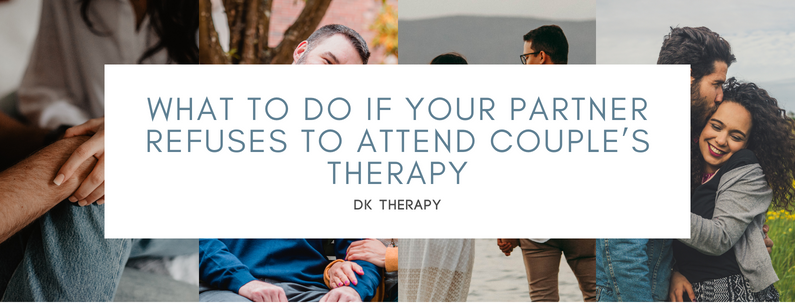
Therapy provides people with valuable tools and skills to help people tackle almost anything that life throws at them, from creating a healthy work-life balance to overcoming anxiety. While therapy isn’t an instant cure for life problems, it sets individuals up for success. Couples therapy is the same– it provides couples with a safe space to talk and new skills to help keep their relationship positive. But what if your partner doesn’t want to attend?
Here are my top recommendations for people with partners who don’t want to attend couples therapy:
Give them the Benefit of the Doubt
The first thing to consider if your partner refuses to participate in couples therapy is to recognize that they have their reasons. Just because they don’t want to attend couples therapy doesn’t mean that they don’t care about your relationship or want you to struggle– there are tons of reasons why someone wouldn’t want to go to therapy in the first place, much less couples therapy. Acknowledging and accepting that your partner doesn’t want to participate in couples therapy is the first step to moving forward.
Try to Learn Why
Your next step is to find out why they don’t want to go. Your partner has reasons for saying no, and if you feel couples therapy may help strengthen your relationship, you’ll need to listen to what your partner has to say, too. Communication is the backbone of a healthy relationship, after all!
There are many reasons why someone wouldn’t want to participate in couples therapy, including:
Cost
Therapy can be expensive, especially if your insurance does not cover it. For many people, expenses are a major reason they avoid talking to therapists. This isn’t just for therapy; people will put off doctor’s visits, dental care, and other medical help if their insurance doesn’t cover it. One of the biggest stressors that low-income couples face is expenses. A couple with extra funds to put towards couples therapy is more likely to participate in it than one that can’t afford frequent sessions.
Some insurance companies cover things like couples therapy in their plans, but currently, coverage is limited. If your partner is worried about the cost of couples counseling, consider brainstorming ways to work around the financial barrier. Seeking help from couples workshops or using online resources can act as a substitute for regular couples therapy sessions. At DK, we also accept many EAP benefits which would provide a certain amount of sessions at no cost to you.
Previous Experiences
Having a bad experience with a therapist is a great way to get someone turned off therapy for a long time. If your partner has had a bad experience with therapy in the past, let them know that you’re here to support them regardless. It can be hard to find a therapist that clicks, especially if you’re looking for a therapist for two. If either one of you doesn’t click with a therapist, you don’t have to go back.
Fear or Anxiety
 There are many reasons why a person would be nervous about going to couples therapy. What if the therapist takes sides? What if the sessions are filled with angry arguments, or your partner verbally attacks you? What if the thought of simply talking about relationship problems is just too much?
There are many reasons why a person would be nervous about going to couples therapy. What if the therapist takes sides? What if the sessions are filled with angry arguments, or your partner verbally attacks you? What if the thought of simply talking about relationship problems is just too much?
These are all valid concerns about couples therapy, and one of the ways your partner can work through them is via communication. “I statements” are a great way to express feelings without blaming another person, and you can use them on your therapist if you feel they’re taking sides. A relationship counselor will also remind you and your partner to stick with these statements if things start to get heated.
As for anxieties about just talking about relationship problems, consider asking your partner if they’ve considered therapy before– if they’re averse to private therapy too, let them know that you’re here to support them, but their mental health isn’t your responsibility.
Belief that Couple’s Therapy is Only for “Bad Relationships”
The belief that “only people in toxic relationships go to couples therapy” is rooted in the same stigma that the concept of “only crazy people go to therapy” is. The truth is, therapy is something that everyone at some point may need: therapists teach people essential skills for communicating and handling emotions, and in couples counseling, this is no different. A relationship therapist is a licensed expert that can help you and your partner communicate on the same wavelength and potentially avoid serious relationship problems later on.
Like a vaccine, therapy isn’t necessarily a cure or a way to “fix” a relationship. It simply provides both parties with the skills needed to handle future problems.
Address Their Concerns
After listening to your partner’s concerns, address them in a positive way. Answer any questions they may have about counseling, and remember to be patient! It’s normal for someone to be nervous about trying new things, and therapy is no different. One way to work through a partner’s concerns about couples therapy is to research it together; look into relationship help books, blogs, and accounts from people who have gone to couples therapy.
Attend Therapy Yourself
Remember that no means no. If your partner doesn’t want to attend couples therapy, respect their decision– that doesn’t mean you can’t go to therapy alone! Gottman states that a relationship is made of three parts: you, your partner, and how the two of you intersect. That means you have complete control over at least one part of the relationship– yourself! Visiting a therapist to discuss your relationship problems might also provide insight into how you can better communicate your thoughts and feelings with your partner. Maybe they’ll see some changes you’ve made and want to join in.
Regardless, we’re here to help if you’re looking for couples counseling or traditional, one-on-one therapy. Contact us today for more information.




